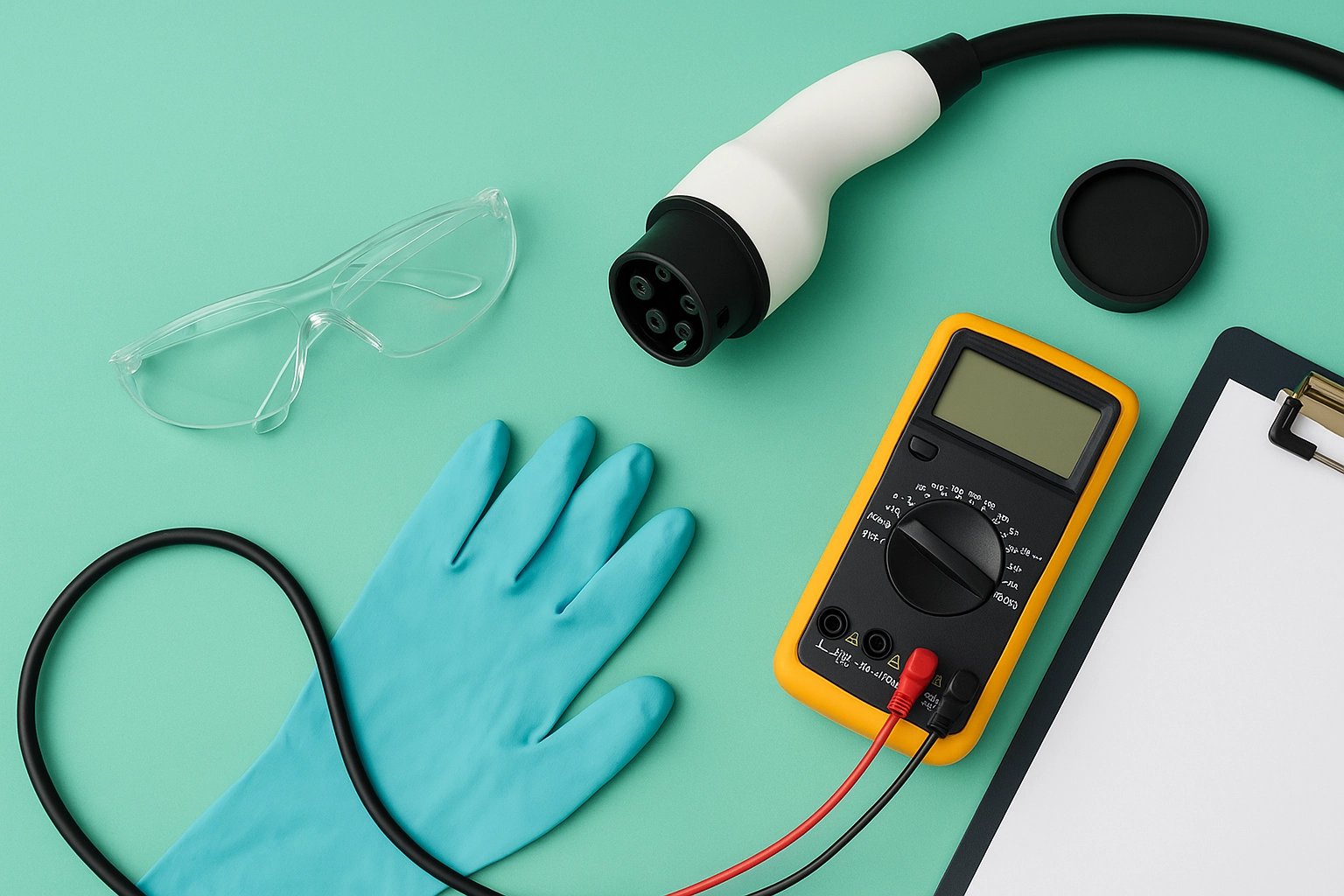IEC 62196 1 EV Connector General Requirements Test
The IEC 62196-1 standard is an essential requirement for ensuring the safety, reliability, and compatibility of electric vehicle (EV) charging connectors. Compliance with this standard guarantees that all components are designed to withstand the environmental stresses they will encounter throughout their lifecycle, from manufacturing through installation and use.
Testing under IEC 62196-1 involves a series of rigorous procedures aimed at assessing various performance metrics critical for EV charger reliability. These include mechanical strength testing, electrical insulation verification, and resistance to environmental factors such as humidity, temperature cycling, and dust ingress. The tests are conducted using specialized equipment that simulates real-world conditions.
Manufacturers must ensure their chargers meet the stringent criteria outlined in this standard to avoid potential issues like connector failures or safety hazards. Non-compliance can lead to product recalls, regulatory penalties, and loss of market credibility. Therefore, thorough testing is crucial for maintaining a high level of quality and ensuring that products are safe and reliable.
The IEC 62196-1 standard covers general requirements for electrical vehicle charging connectors, including their design, construction, and performance characteristics. It specifies the dimensional and mechanical properties necessary to ensure compatibility with various types of EVs and charge points. The testing process involves several stages:
- Visual inspection: Checks for any visible defects or imperfections in the connector.
- Mechanical strength tests: Evaluates how well the connector can withstand physical stresses such as bending, twisting, and pulling forces.
- Electrical insulation verification: Ensures that there are no electrical shorts or leaks within the connector which could lead to safety hazards.
- Environmental stress testing: Simulates harsh environmental conditions like temperature extremes, humidity, and dust exposure. This helps identify any potential weaknesses in the connector’s design before they become problematic during actual use.
The results of these tests are documented comprehensively to provide clear evidence that all aspects of the product meet or exceed the specified standards. Compliance with IEC 62196-1 is not only a requirement but also an assurance for consumers and stakeholders about the quality and safety of EV charging solutions.
By adhering strictly to these tests, manufacturers can ensure their products are reliable, safe, and compatible with existing infrastructure. This adherence also facilitates smoother integration into new markets and encourages broader adoption of electric vehicles. Regular testing ensures ongoing compliance even as product designs evolve over time.
Scope and Methodology
The scope of the IEC 62196-1 test encompasses a wide range of parameters critical to the safe and effective operation of EV charging connectors. The methodology involves several key steps:
- Preparation of Test Specimens: Prior to testing, each connector undergoes thorough preparation including cleaning, drying, and conditioning to simulate real-world conditions.
- Visual Inspection: Each connector is visually inspected for any visible defects or imperfections. This step ensures that no issues are overlooked during the more rigorous tests that follow.
- Mechanical Strength Testing: The connectors undergo various mechanical stress tests to evaluate their ability to withstand physical forces without damage. These tests include pull-off tests, bend tests, and twist tests among others.
- Electrical Insulation Verification: Electrical insulation tests are conducted to ensure there is no leakage or short circuiting within the connector. This step is crucial for preventing electrical hazards.
- Environmental Stress Testing: The connectors are subjected to simulated environmental conditions such as high and low temperatures, humidity levels, and dust exposure. This helps identify any potential weaknesses in the connector’s design that might not be apparent under normal operating conditions.
The results of these tests are meticulously recorded and analyzed. Compliance with all specified criteria is mandatory for passing this test successfully. Any failures necessitate corrective actions, which may involve redesigning parts or improving manufacturing processes until full compliance is achieved.
Quality and Reliability Assurance
Ensuring the highest levels of quality and reliability in EV charging connectors is paramount for maintaining consumer trust and market competitiveness. At our laboratory, we employ state-of-the-art facilities and experienced personnel to carry out these tests accurately and consistently.
We have established robust processes aimed at preventing errors during testing while ensuring that every detail is captured accurately. This includes strict adherence to international standards such as IEC 62196-1, which guides our testing protocols. By doing so, we can provide clients with reliable test results they can trust.
Our commitment extends beyond just meeting the minimum requirements; it also involves proactive measures to anticipate potential challenges that could arise during real-world use. For instance, we simulate extreme conditions that connectors might face in different geographical locations or under varying load levels. This comprehensive approach ensures that our tests are not only thorough but also highly relevant.
Quality assurance is an ongoing process at our laboratory. We continuously monitor and update our testing procedures based on feedback from clients and advancements in technology. Our goal is to stay ahead of industry trends, ensuring that we provide the most accurate and reliable test results possible.
Environmental and Sustainability Contributions
- Promoting Sustainable Transportation: By ensuring compliance with IEC 62196-1, we support the development of reliable EV charging infrastructure. This contributes to reducing reliance on fossil fuels and promoting cleaner forms of transportation.
- Enhancing Resource Efficiency: Our testing helps manufacturers design connectors that are durable and efficient, minimizing waste throughout their lifecycle. This aligns with broader sustainability goals by encouraging the use of resources more efficiently.
- Reduction in Environmental Impact: Ensuring robustness through thorough testing reduces the likelihood of premature failures leading to increased demand for replacements and disposal, thereby lowering overall environmental impact.
Through these efforts, we contribute significantly to fostering a more sustainable future by supporting the transition towards greener transportation solutions. Our commitment aligns with global initiatives aimed at combating climate change and promoting environmentally responsible practices.





